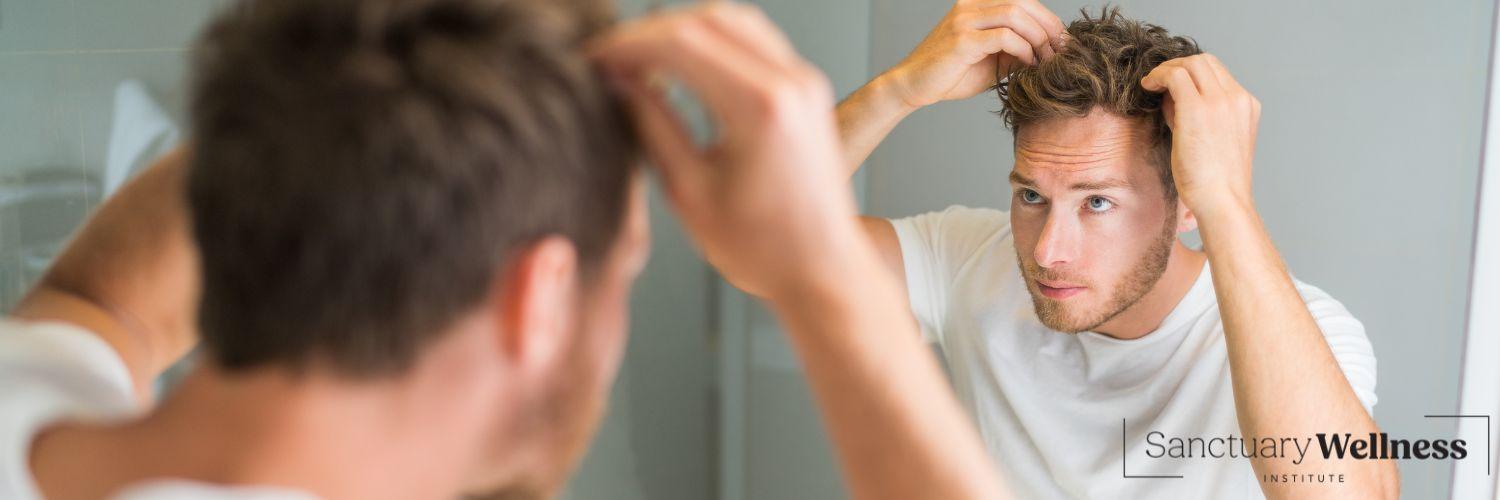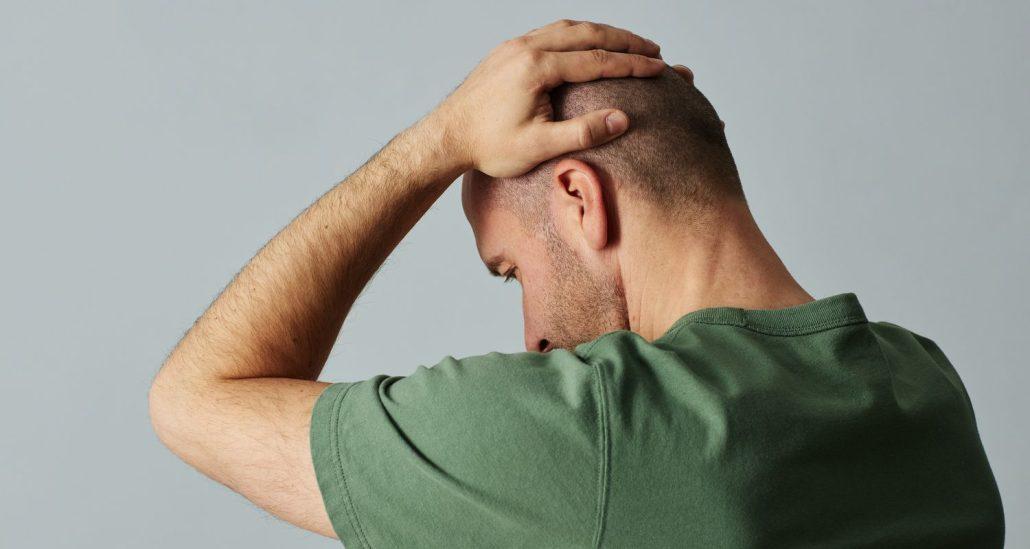- John DiBella
- Published: December 9, 2024
- Fact-checked by Dr. Desiree Granados

Hair loss can be a distressing experience for anyone, often sparking questions about its underlying causes. Hormone levels are often tied to hair growth and loss, particularly testosterone levels.
Low testosterone (Low T) can affect various bodily functions, including hair growth. Understanding the connection between Low T and hair loss is essential for identifying potential solutions and improving overall health.
Does Low Testosterone Cause Hair Loss?
When testosterone levels are low, the body’s hormonal balance can shift, potentially leading to hair thinning or loss. However, Low T is not the sole cause of hair loss. Other factors, such as genetics, stress, nutritional deficiencies, and medical conditions, often play a significant role.
Low testosterone affects hair loss by disrupting the balance of hormones responsible for hair growth and maintenance. The androgen dihydrotestosterone (DHT) is a derivative of testosterone and helps with the development of body and facial hair by stimulating hair follicles on the scalp.
Additionally, low testosterone can impact the health of sebaceous glands, which produce natural oils that keep hair hydrated. Without adequate oil production, hair may become dry and fragile, further contributing to hair loss.
Wondering if you might have low testosterone? Take our quiz to find out!
Signs of Low Testosterone That Impact Hair Health
Low testosterone can manifest through various symptoms, some of which directly or indirectly affect hair health. These include:
- Thinning Hair: Reduced testosterone levels may lead to slower hair growth or thinning hair, particularly on the scalp.
- Decreased Body and Facial Hair: Low T may also reduce body and facial hair growth over time.
- Fatigue and Stress: Hormonal imbalances can cause chronic fatigue and stress, which may exacerbate hair shedding.
- Dry and Brittle Hair: Low testosterone can impact the oil production in hair follicles, leading to dryness and brittleness.
If you experience these symptoms alongside hair loss, it’s essential to consult a healthcare provider to determine if Low T is the underlying cause.

Treatment Options for Low Testosterone and Hair Loss
Addressing Low T and hair loss often involves a multi-faceted approach. Here are some effective treatment options:
- Testosterone Replacement Therapy (TRT): This medical treatment can restore healthy testosterone levels and alleviate associated symptoms. TRT may indirectly support hair health, though it may not reverse all cases of hair loss.
- Hair Restoration Treatments: Options like topical minoxidil, finasteride, or PRP (platelet-rich plasma) therapy can stimulate hair growth and improve hair density.
- Lifestyle Changes: A nutrient-rich diet, regular exercise, and stress reduction can promote better hormonal balance and hair health.
- Medical Consultation: Consulting a dermatologist or endocrinologist can help identify the most suitable treatment based on your unique needs.
Conclusion
Low testosterone can impact hair health in several ways, from thinning hair to reduced body and facial hair growth. While maintaining healthy testosterone levels may not guarantee hair loss prevention, addressing Low T through targeted therapies can improve overall well-being and potentially support hair regrowth.
Combining hormonal treatments with lifestyle changes and specialized hair restoration therapies can maximize results. If you suspect Low T is contributing to your hair loss, consult a healthcare provider to explore the best course of action tailored to your needs.
Frequently Asked Questions
Can taking testosterone cause hair loss?
Testosterone therapy can potentially cause hair loss in individuals predisposed to androgenetic alopecia due to its effect on DHT production. Elevated testosterone levels can increase DHT, a hormone known to impact scalp hair follicles.
For those with genetically sensitive follicles, this stimulation often leads to thinning hair and hair loss rather than growth. Monitoring DHT levels during therapy can help manage this risk and explain why some individuals experience hair loss while undergoing testosterone replacement therapy.
Does low testosterone cause hair loss for women?
Yes, low testosterone can contribute to hair loss in women, though it is less common than in men. Testosterone plays a role in maintaining healthy hair growth, and imbalances can lead to thinning hair or reduced hair density. Other hormonal changes, such as reduced estrogen during menopause, often exacerbate the effects of low testosterone on hair health in women.
How we reviewed this article:
- Kevin J. Kinter; Razie Amraei; Aabha A. Anekar (2023). Biochemistry, Dihydrotestosterone
https://www.ncbi.nlm.nih.gov/books/NBK557634/ - Saskia P Hagenaars, W David Hill, Sarah E Harris, Stuart J Ritchie, Gail Davies, David C Liewald, Catharine R Gale, David J Porteous, Ian J Deary, Riccardo E Marioni (2017). Genetic prediction of male pattern baldness
https://pmc.ncbi.nlm.nih.gov/articles/PMC5308812/ - Izabela Urysiak-Czubatka, Małgorzata L Kmieć, Grażyna Broniarczyk-Dyła (2014). Assessment of the usefulness of dihydrotestosterone in the diagnostics of patients with androgenetic alopecia
https://pmc.ncbi.nlm.nih.gov/articles/PMC4171668/#S0017 - NIH (2021). How stress causes hair loss
https://www.nih.gov/news-events/nih-research-matters/how-stress-causes-hair-loss - RL Glaser, C Dimitrakakis, AG Messenger (2012). Improvement in scalp hair growth in androgen-deficient women treated with testosterone: a questionnaire study
https://pmc.ncbi.nlm.nih.gov/articles/PMC3380548/ - Rajendrasingh J Rajput (2022). Influence of Nutrition, Food Supplements and Lifestyle in Hair Disorders
https://pmc.ncbi.nlm.nih.gov/articles/PMC9650738/
Current Version
December 09, 2024
Written By
John DiBella
Fact-checked By
Dr. Desiree Granados
Editorial Process
Our Editorial Process

John DiBella is the co-founder and CEO at The Sanctuary Wellness Institute. His goal is to foster healthier lifestyles to improve individuals’ quality of life and health span through online medical and non-medical services. When he’s not writing health & wellness articles for The Sanctuary, he enjoys hiking, camping, surfing and sailing.







